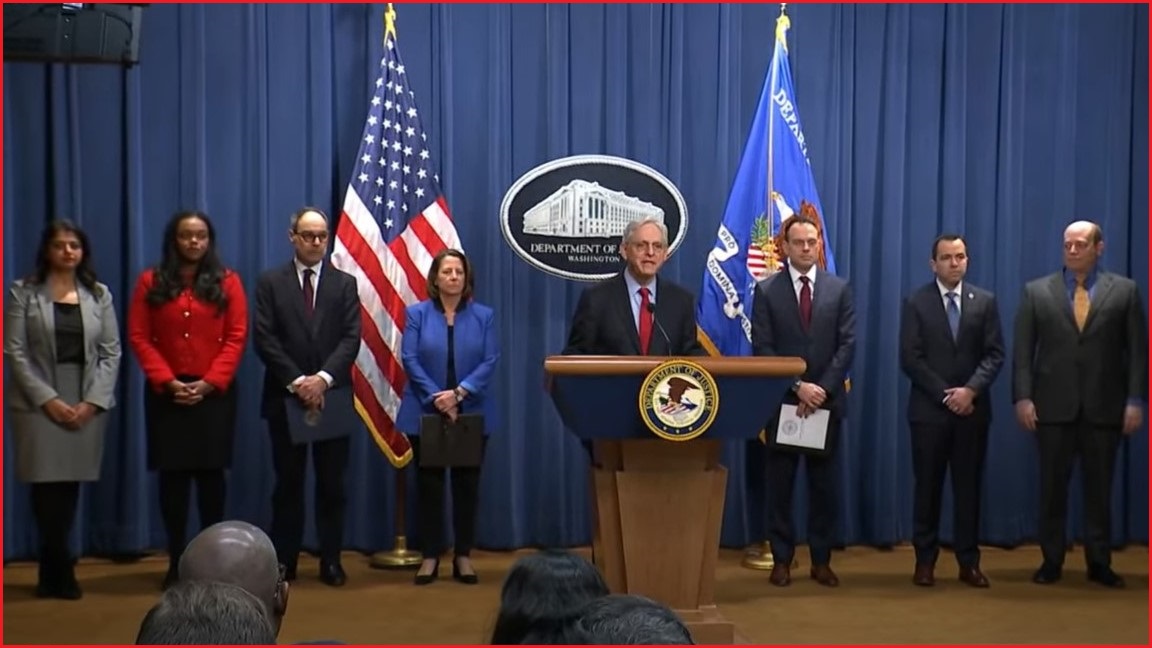The US government has filed a significant antitrust lawsuit against Apple alleging the tech giant has overseen an illegal iPhone monopoly that has led to higher prices and less innovation for consumers.
The US Department of Justice and 16 Attorneys-General filed an 88-page lawsuit in New Jersey federal court late last week accusing Apple of violating antitrust laws by preventing access to its systems for competitors to “lock in” users to its products.
The filing is the culmination of a several-year probe into Apple’s alleged anti-competitive practices that has been a significant part of the Biden government’s economic tactics.
The lawsuit focuses on Apple blocking out competition from a range of its services, including messaging apps, digital wallets and cloud-streaming services, forcing consumers to use its own services and making them less likely to change to a rival’s device.
“This case is about freeing smartphone markets from Apple’s anti-competitive and exclusionary conduct and restoring competition to lower smartphone prices for consumers, reducing fees for developers, and preserving innovation for the future,” the lawsuit reads.
“Each step in Apple’s course of conduct built and reinforced the moat around its smartphone monopoly.”
US Attorney-General Merrick Garland said these practices by Apple had led to “higher prices and less innovation” for its customers.
“Apple has maintained monopoly power in the smartphone market not simply by staying ahead of the competition on the merits but by violating federal antitrust law,” Garland said at a price conference.
“Customers should not have to pay higher prices because companies break the law.”
Making it harder to switch devices
The US authorities are arguing that Apple has used its dominance over the smartphone market to prevent access to innovations that would have made it smoother and more efficient for users to switch devices, further entrenching its monopoly.
It did this through its control of the App Store, which serves to “lock in” customers and developers to the iOS system, efforts to make it difficult for iPhones to connect with smartwatches offered by competitors, and the blocking of banks and fintechs from accessing its digital wallet technology, the case alleges.
The lawsuit also looks at how Apple treats messages from rival devices differently to those from other iPhones.
Apple has already railed against the lawsuit in a statement, saying that it is “wrong on the facts and the law” and that the company will “vigorously defend against it”.
“[It] sets a dangerous precedent, empowering government to take a heavy hand in designing people’s technology,” the Apple statement said.
“At Apple, we innovate every day to make technology people love - designing products that work seamlessly together, protect people’s privacy and security, and create a magical experience for our users.
“This lawsuit threatens who we are and the principles that set Apple products apart in fiercely competitive markets.”
In the lawsuit, the US Attorneys-General are asking the courts to order Apple to stop engaging in a range of practices it said are stamping out competition and restricting access to its operating system.
Antitrust actions around the world
There has been recent intense scrutiny on the antitrust practices of the biggest tech firms in the world, with a particular emphasis on app stores.
In the European Union, new regulations have forced Apple to open up its iOS platform, including by allowing users to download apps from third-party app stores and use payment services other than Apple Pay to make purchases within them.
Apple was also recently fined $3 billion (1.84 billion euros) by the European Union for unfairly favouring its own streaming service Apple Music over its competitors.
The case, brought forward by Spotify, alleged Apple did not properly inform users of cheaper options available to them if they bought subscriptions outside of Apple’s ecosystem.
It marked the first antitrust penalty imposed against Apple in the European Union, with many more actions in train.
Apple is also currently embroiled in a legal fight with Fortnite developer Epic Games in Australia in a case that is expected to run for several months.
The lawsuit is focusing on allegations Apple is operating an illegal monopoly through its App Store by not allowing its users to make fair decisions on how and where they download apps such as Fortnite, and how they make purchases within these apps.
Apple won on nine out of the 10 allegations made by Epic in a similar case in the US, where a judge ruled that Apple was not operating a monopoly but did have to allow developers to offer in-app purchases outside of Apple’s payments system.










